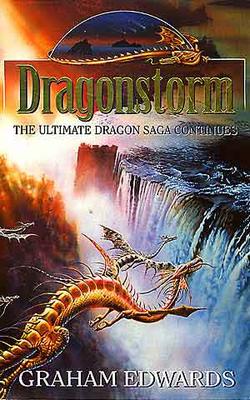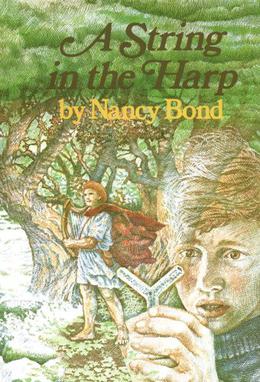A trilogy is a set of three distinct works that are connected and can be seen either as a single work or as three individual works. They are commonly found in literature, film, and video games. Three-part works that are considered components of a larger work also exist, such as the triptych or the three-movement sonata, but they are not commonly referred to with the term "trilogy".

Historical fiction is a literary genre in which a fictional plot takes place in the setting of particular real historical events. Although the term is commonly used as a synonym for historical fiction literature, it can also be applied to other types of narrative, including theatre, opera, cinema, and television, as well as video games and graphic novels.

Gwydion fab Dôn is a magician, hero and trickster of Welsh mythology, appearing most prominently in the Fourth Branch of the Mabinogi, which focuses largely on his relationship with his young nephew, Lleu Llaw Gyffes. He also appears prominently in the Welsh Triads, the Book of Taliesin and the Stanzas of the Graves.

Maelgwn Gwynedd was king of Gwynedd during the early 6th century. Surviving records suggest he held a pre-eminent position among the Brythonic kings in Wales and their allies in the "Old North" along the Scottish coast. Maelgwn was a generous supporter of Christianity, funding the foundation of churches throughout Wales and even far beyond the bounds of his own kingdom. Nonetheless, his principal legacy today is the scathing account of his behavior recorded in De Excidio et Conquestu Britanniae by Gildas, who considered Maelgwn a usurper and reprobate. The son of Cadwallon Lawhir and great-grandson of Cunedda, Maelgwn was buried on Ynys Seiriol, off the eastern tip of Anglesey, having died of the "yellow plague"; quite probably the arrival of Justinian's Plague in Britain.

Taliesin was an early Brittonic poet of Sub-Roman Britain whose work has possibly survived in a Middle Welsh manuscript, the Book of Taliesin. Taliesin was a renowned bard who is believed to have sung at the courts of at least three kings.
Traci Harding is an Australian novelist. Her work blends fantasy, fact, esoteric belief, time travel and quantum physics, into adventurous romps through history, alternative dimensions, universes and states of consciousness.
The Trinity is the Christian doctrine of one God in three persons.

The Kingdom of Gwynedd was a Welsh kingdom and a Roman Empire successor state that emerged in sub-Roman Britain in the 5th century during the Anglo-Saxon settlement of Britain.
Rhun ap Maelgwn Gwynedd, also known as Rhun Hir ap Maelgwn Gwynedd, sometimes spelt as 'Rhûn', was King of Gwynedd. He came to the throne on the death of his father, King Maelgwn Gwynedd. There are no historical records of his reign in this early age. A story preserved in both the Venedotian Code and an elegy by Taliesin says that he waged a war against Rhydderch Hael of Alt Clut and the kings of Gododdin or Manaw Gododdin. The small scattered settlement of Caerhun in the Conwy valley is said to be named for him, though without strong authority. Rhun also appears in several medieval literary stories, as well as in the Welsh Triads. His wife was Perwyr ferch Rhûn "Ryfeddfawr" and their son was Beli ap Rhun "Hîr".

Urien, often referred to as Urien Rheged or Uriens, was a late 6th-century king of Rheged, an early British kingdom of the Hen Ogledd of the House of Rheged. In Arthurian legend, he inspired the character of King Urien of either Garlot (Garloth) or Gore (Gorre). His most famous son, Owain mab Urien, similarly turned into the character of Ywain.
Tablet of Destinies is a fantasy novel by Traci Harding. It is the second installment of a trilogy known as The Celestial Triad. The story follows a 20th-century Australian woman who is transported to 5th century Wales in an attempt to change the future. Major themes within the book include time travel, martial arts, magic and psychic phenomenon.

Dragonstorm is a fantasy novel written by Graham Edwards. The novel was first published in 1996 by Voyager Books (UK) and HarperPrism (US). It is the second book in the Ultimate Dragon Saga trilogy. This book introduces the dragon Archan, who returns in a larger role in Edwards' Stone trilogy.

Wales in the early Middle Ages covers the time between the Roman departure from Wales c. 383 until the middle of the 11th century. In that time there was a gradual consolidation of power into increasingly hierarchical kingdoms. The end of the early Middle Ages was the time that the Welsh language transitioned from the Primitive Welsh spoken throughout the era into Old Welsh, and the time when the modern England–Wales border would take its near-final form, a line broadly followed by Offa's Dyke, a late eighth-century earthwork. Successful unification into something recognisable as a Welsh state would come in the next era under the descendants of Merfyn Frych.
The Keltiad is a body of epic fantasy works written by Patricia Kennealy-Morrison. There are eight novels in the series and one collection of short stories.
The Celestial Triad is a set of fantasy novels by Traci Harding. The story follows a 20th-century Australian woman who is transported to 5th century Wales in an attempt to change the future. Major themes within the series include time travel, martial arts, magic and psychic phenomenon. It is the second trilogy to feature the characters concerned, the first being The Ancient Future Trilogy.

The Misfortunes of Elphin (1829) is a short historical romance by Thomas Love Peacock, set in 6th century Wales, which recounts the adventures of the bard Taliesin, the princes Elphin ap Gwythno and Seithenyn ap Seithyn, and King Arthur. Peacock researched his story from early Welsh materials, many of them untranslated at the time; he included many loose translations from bardic poetry, as well as original poems such as "The War-Song of Dinas Vawr". He also worked into it much satire of the Tory attitudes of his own time. Elphin has been highly praised for its sustained comic irony, and by some critics is considered the finest Arthurian literary work of the Romantic period.

A String in the Harp is a children's fantasy novel by Nancy Bond first published in 1976. It received a 1977 Newbery Honor award and the Welsh Tir na n-Og Award. It tells of the American Morgan family who temporarily move to Wales, where Peter Morgan finds a magical harp key that gives him vivid visions of the past. This well-received novel is an unusual time travel story, with its focus on the emotional pain and separation the Morgans experience after the death of their mother and the gradual healing they find through their experiences.

Saint Eigen, Eurgen, Eurgain or Eurgan was the legendary, and possibly historical first female Christian saint among the Britons. Her name has doubtfully been linked to two Welsh churches and is found in manuscripts from the collection of Iolo Morganwg making historical evidence of her existence dubious and limited.

Porius: A Romance of the Dark Ages is a 1951 historical romance by John Cowper Powys. Set in the Dark Ages during a week of autumn 499 AD, this novel is, in part, a bildungsroman, with the adventures of the eponymous protagonist Porius, heir to the throne of Edeyrnion, in North Wales, at its centre. The novel draws from both Arthurian legend and Welsh history and mythology, with Myrddin (Merlin) as another major character. The invasion of Wales by the Saxons and the rise of the new religion of Christianity are central themes. Due to the demands of publishers and a paper shortage in Britain, Powys was forced to excise more than 500 pages from the 1951 version. It wasn't until 2007 that the full novel, as Powys intended his magnum opus to be, was published both in Britain and America.
Rhun is a Welsh Masculine given name meaning "Great, Mighty". Variants of the name are; Rhûn, Rhyn and Rhŷn.











